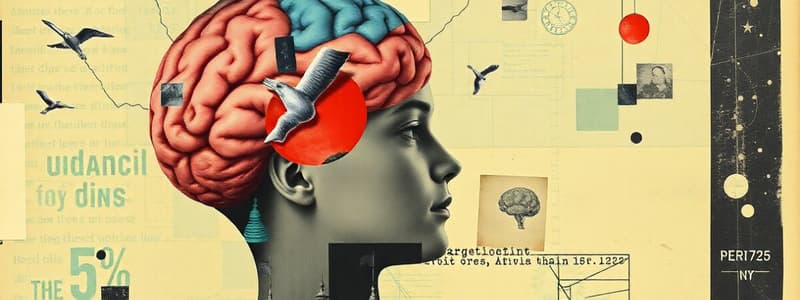Podcast
Questions and Answers
How does cognitive development affect perception of emotions as one matures?
How does cognitive development affect perception of emotions as one matures?
- There is no change in emotional understanding as one grows.
- Young children remain unaware of different emotional interpretations.
- People become better at understanding only happy emotions.
- Maturity allows individuals to recognize complex emotional states. (correct)
What is a potential impact of the independence experienced during adolescence?
What is a potential impact of the independence experienced during adolescence?
- It always leads to wise decision-making.
- Independence eliminates all risks in decision-making.
- It provides opportunities to make important decisions. (correct)
- Adolescents become less responsible over time.
What is one reason decision-making might not improve with brain development alone?
What is one reason decision-making might not improve with brain development alone?
- Experience and practice are necessary to strengthen decision-making. (correct)
- Cognitive development prevents mistakes.
- Adolescents rarely practice making decisions.
- Older individuals are less capable of learning.
Which of the following best describes risky behavior during adolescence?
Which of the following best describes risky behavior during adolescence?
What misconception might young people have about their decision-making abilities?
What misconception might young people have about their decision-making abilities?
Flashcards
Cognition
Cognition
The ability to gain knowledge and understanding.
Decision-making
Decision-making
The ability to make choices, especially when facing uncertainty or potential risks.
Independence
Independence
The ability to act on one's own initiative, without constant supervision or guidance.
Risky Behavior
Risky Behavior
Signup and view all the flashcards
Practice (in decision-making)
Practice (in decision-making)
Signup and view all the flashcards
Study Notes
Brain Development and Maturation
- The brain, like the body, undergoes changes during maturation.
- Cognitive abilities, including knowledge and comprehension, improve.
- Perspective-taking evolves; younger children may interpret crying as sadness, while older individuals might consider other possibilities.
Adolescent Brain Changes
- Brain development mirrors physical development, sometimes leading to awkward or uncoordinated feelings.
- Brain changes don't automatically lead to wiser decision-making.
- Experience and practice are crucial for improving decision-making skills.
- Independence development begins during adolescence, requiring navigating risks involved with decision-making.
Decision-Making and Risk-Taking
- Decision-making is a learned skill requiring practice.
- Mistakes are inevitable during the learning process.
- Risk-taking involves actions with potential negative or dangerous outcomes.
- Risks can be irreversible.
Adolescent Risks
- Risky behaviors can result in severe consequences: expulsion, arrest, pregnancy, illnesses, injuries, or death.
Studying That Suits You
Use AI to generate personalized quizzes and flashcards to suit your learning preferences.
Description
This quiz explores the intricate changes in brain development during adolescence, focusing on cognitive maturation, decision-making, and risk-taking. It highlights how understanding and perspective evolve and the importance of experience in improving decision-making skills. Get ready to test your knowledge on how these elements shape adolescent behavior!




